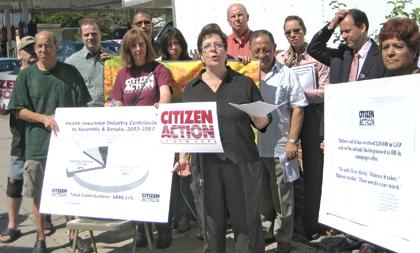By Jeremy Walsh
Health insurance industry contributions that fuel political campaigns in Albany help keep Queens residents struggling to pay for health care, a statewide advocacy group said last week.
Republicans in the state Senate were the beneficiaries of the bulk of nearly $900,000 in campaign contributions from the health insurance industry, a new report from the nonprofit advocacy group Citizen Action of New York claims.
Activists said such funding helps preserve the status quo that makes health care unaffordable for Glendale and other neighborhoods and blamed the current campaign finance system for what they see as an unwillingness by the Senate to pass any health care reform.
A bill regulating health care premiums passed the Assembly each year between 1998 and 2006, but did not come to a vote in the Senate.
Gathering across the street from state Sen. Serphin Maltese's (R-Glendale) campaign office on Myrtle Avenue, advocates and residents called for action on legislation protecting health care consumers.
They pointed out that Senate Republicans, who have a one-seat majority in the chamber, received $618,152 from the health insurance industry between 2002 and 2007, 69 percent of all contributions from that industry.
Pam Bennett, director of Citizen Action, said Maltese has not directly received any campaign contributions from the health insurance industry, but noted his re-election bid is being funded by other Republicans who have received such funds.
“It's absurd to think that campaign contributions are holding up legislation,” Maltese said. “There's one bill [S.8357] that's right on the governor's desk that passed both the Assembly and Senate. It creates health insurance policies for adults 19 to 26 that recently graduated from college. This specifically offers them health insurance policies. It's a basic level of provider care … for about $100 a month.”
The report also showed that state Assembly Democrats, the majority in the lower house, received $177,798 from the health insurance industry, 20 percent of the total between 2002 and 2005. By contrast, Assembly Republicans received $39,325.
Glendale resident Gloria Baksh said she got used to quality health insurance while in graduate school. But her good fortune began to wane in 2002, when her 3-year-old son was stricken with his first asthma attack, leading to numerous emergency room visits each year.
“At first we had excellent coverage,” she said. “But year after year, fewer providers would accept our coverage.”
Baksh wound up taking out a $15,000 loan to cover her son's health expenses.
Bushwick, Brooklyn, resident Kenia Velazquez, 34, said she is torn between taking a better paying job and keeping her Medicaid, a public health insurance plan for people with limited incomes.
Glendale resident Paul Finnegan, 42, said the company he worked for on Long Island moved to Chicago earlier this year. Finnegan chose to stay behind and pursued his dream of opening his own information technology business. His employers agreed to pay for his insurance through November.
“After that, it will cost me $1,400 a month to continue the same level of coverage,” he said. “That may mean the difference between holding on to my dream and providing health care for my family.”
Reach reporter Jeremy Walsh by e-mail at jwalsh@timesledger.com or by phone at 718-229-0300, Ext. 154.



































